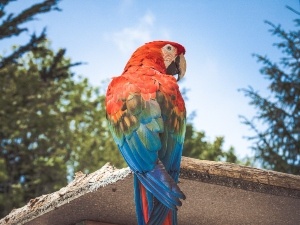
Illness can affect all animals, your bird may try to hide the fact that it is ill but you’ll notice signs soon enough.
This article is a look at all you need to know if you think your parrot has a stomach infection.
Table of Contents
Parrot stomach infection:
Parrots can become infected with a variety of bacteria and these can cause all types of infections in the bird, stomach infections included.
Bacteria that can cause infections exist all around us and all around birds too.
Bird immune systems are usually strong enough to keep infections from developing but your parrot’s immune system becomes compromised, or if the strength of the virus is too strong for the bird’s immune system to fight off, and your parrot is exposed to the bacteria, then the bird will become infected.
How do birds get infected?
Your parrot may have become infected by coming into contact with surfaces contaminated with bacteria, or by coming into contact with the feces of an infected bird.
Stressed parrots are more susceptible to catching illnesses than parrots who are not stressed.
Stress can cause your bird’s body to develop a weakened immune system and this can cause the bird to be more susceptible to getting sick.
Stress can develop in parrots who move into new environments, who experience major temperature changes in their environment, and, stress can develop in birds who experience threats entering their environment.
High emotional stress will lead to a parrot that is unhealthy overall.
Symptoms of a stomach infection in parrots:
One of the main signs of a stomach infection in your parrot is diarrhea, the diarrhea that a parrot with a stomach infection will produce may be green or yellow in color.
This is because infections not only affect the parrot’s GI tract, but infections may also affect the bird’s liver causing excessive bile to be created by the liver which causes the bird to create bright yellow urine and bright green or yellow feces.
When infected, your parrot’s body will try to fight off the infection taking energy away from the digestion process and making the bird not want to eat, a lack of appetite will cause weight loss in the bird.
This weight loss will result in lethargy which will make the bird not want to take care of itself anymore and deteriorate.
What to do:
Infections aren’t something that can be treated at home by someone who isn’t a vet, this type of illness needs medications in the form of antibiotics.
Antibiotics need to be prescribed by your vet so scheduling an appointment to see your vet is recommended.
The vet will physically examine your parrot, do tests on the bird, a fecal test included, to determine if your bird does in fact have a stomach infection.
Once diagnosed, the vet will medicate the bird with antibiotics appropriate to its infection.
Common treatments given to birds that have bacterial infections include amoxicillin, doxycycline, azithromycin, cephalexin, and clavulanate.
The appropriate dosage of antibiotics that your parrot should be fed will need need to be calculated by your vet.
If the bird’s immune system is compromised then the bird may also have developed a secondary infection.
If this is the case then the vet will test for this and give the bird medication for the secondary infection as well
Prevention:
Prevention is better than cure, there are a few things you can do to minimize future infections from developing in your bird:
Keep a clean environment:
Your bird can become exposed to bacteria if it comes into contact with contaminated surfaces in its cage, like contaminated utensils, and contaminated nest boxes, and the cage itself can be contaminated as well.
Keep bacteria from spreading by using a non-toxic disinfectant in all of these areas to keep your parrot as safe as you can.
Provide good ventilation:
Making sure that the bird is breathing good, clean, fresh air and has good ventilation at all times will also help to minimize infections.
Feed the bird well:
Feeding the bird all the foods that its body needs will keep its immune system strong and healthy, a strong and healthy immune system will help to keep the bird as safe as possible from infections in the future.
Make sure that your parrot’s diet is well-balanced and nutrient-rich.
Minimize stress:
Because stress can negatively affect the bird’s immune system keeping your bird’s stress levels at a minimum will help to keep its immune system healthy.
Make sure that the temperature of your bird’s environment is kept constant. Make sure that the bird has access to food and water, make sure that no threats come near your bird, and try to avoid making changes to your bird’s environment.
If you enjoyed this article then you may also be interested in other bird related articles. Here are some articles that you may be interested in: Conure Poop Watery, Why Is My Conure So Clingy?, Why Are Cockatoos So Loud?, How To Clean Cockatiel Tail Feathers, No Urates In Bird Poop, Cockatiel Feathers Turning Black, Conure Closing One Eye

